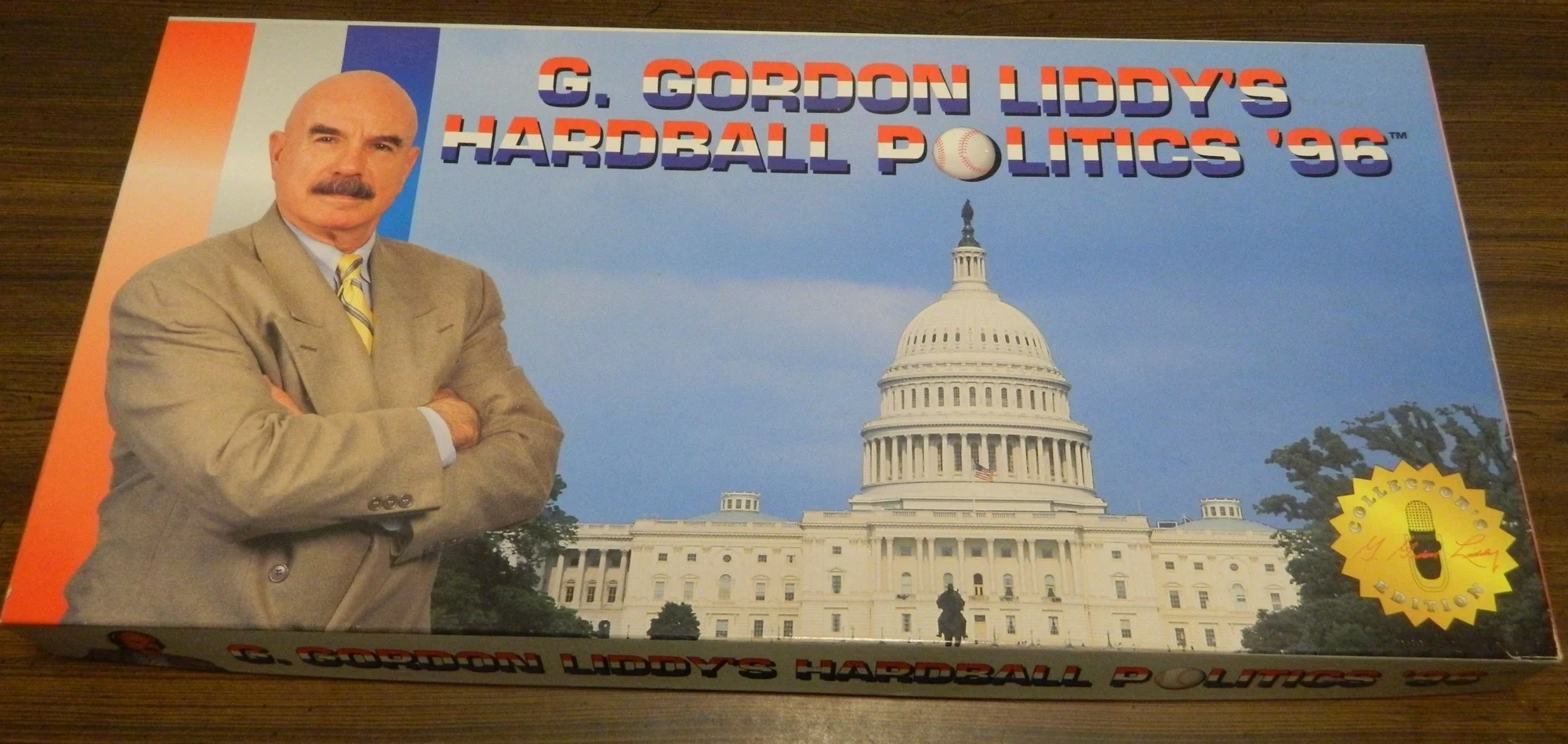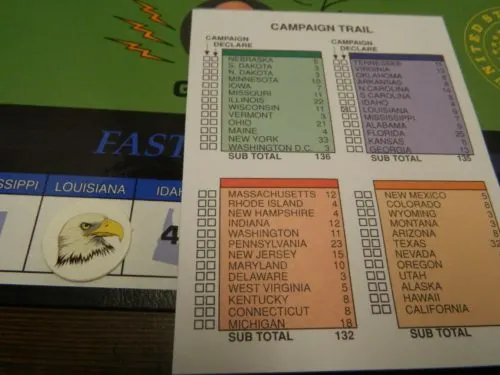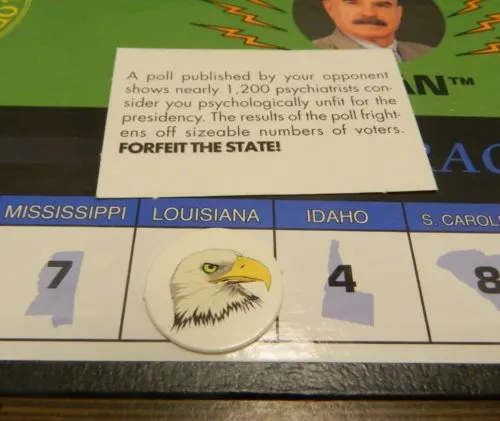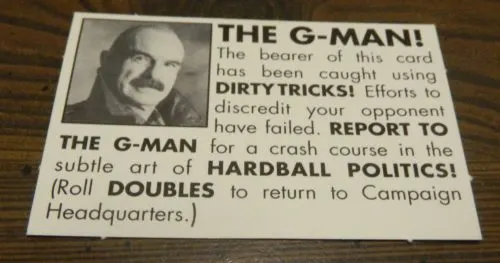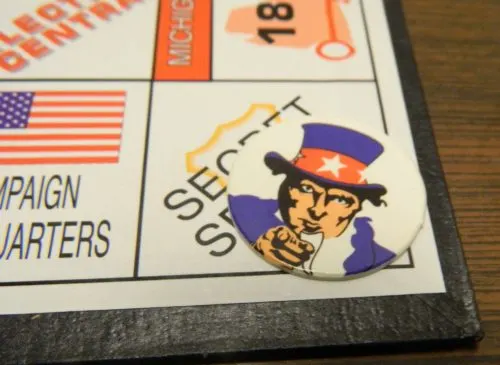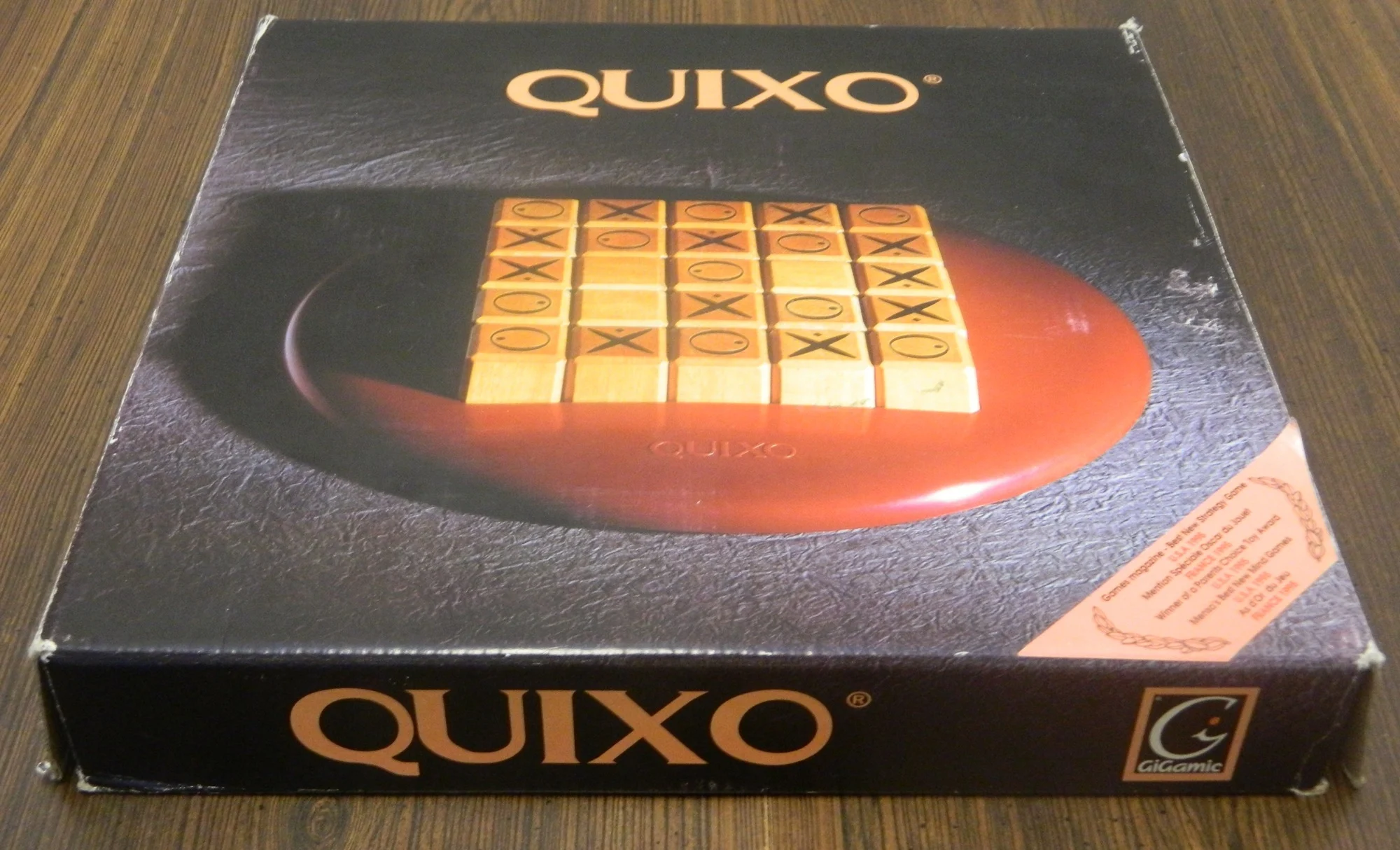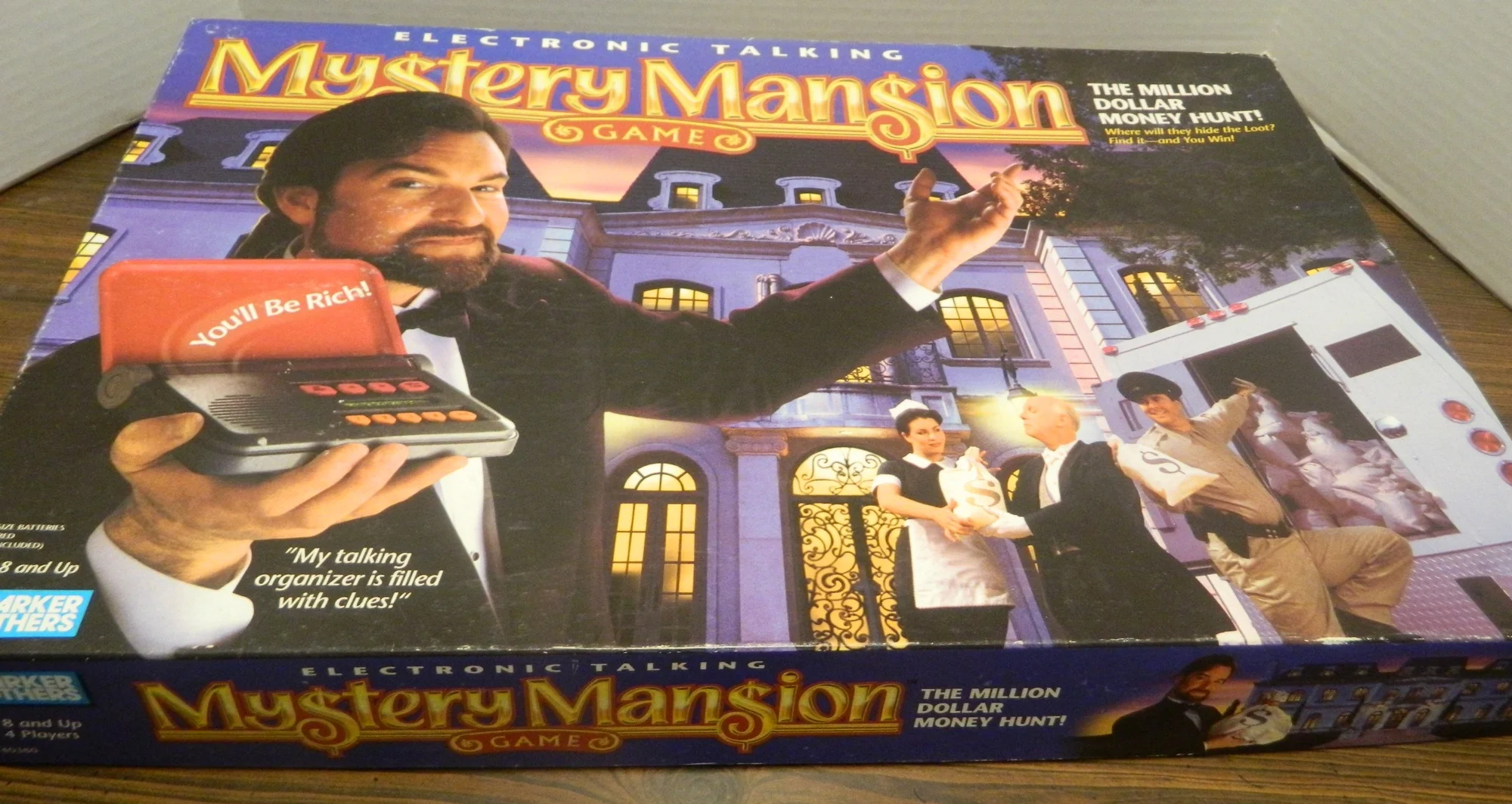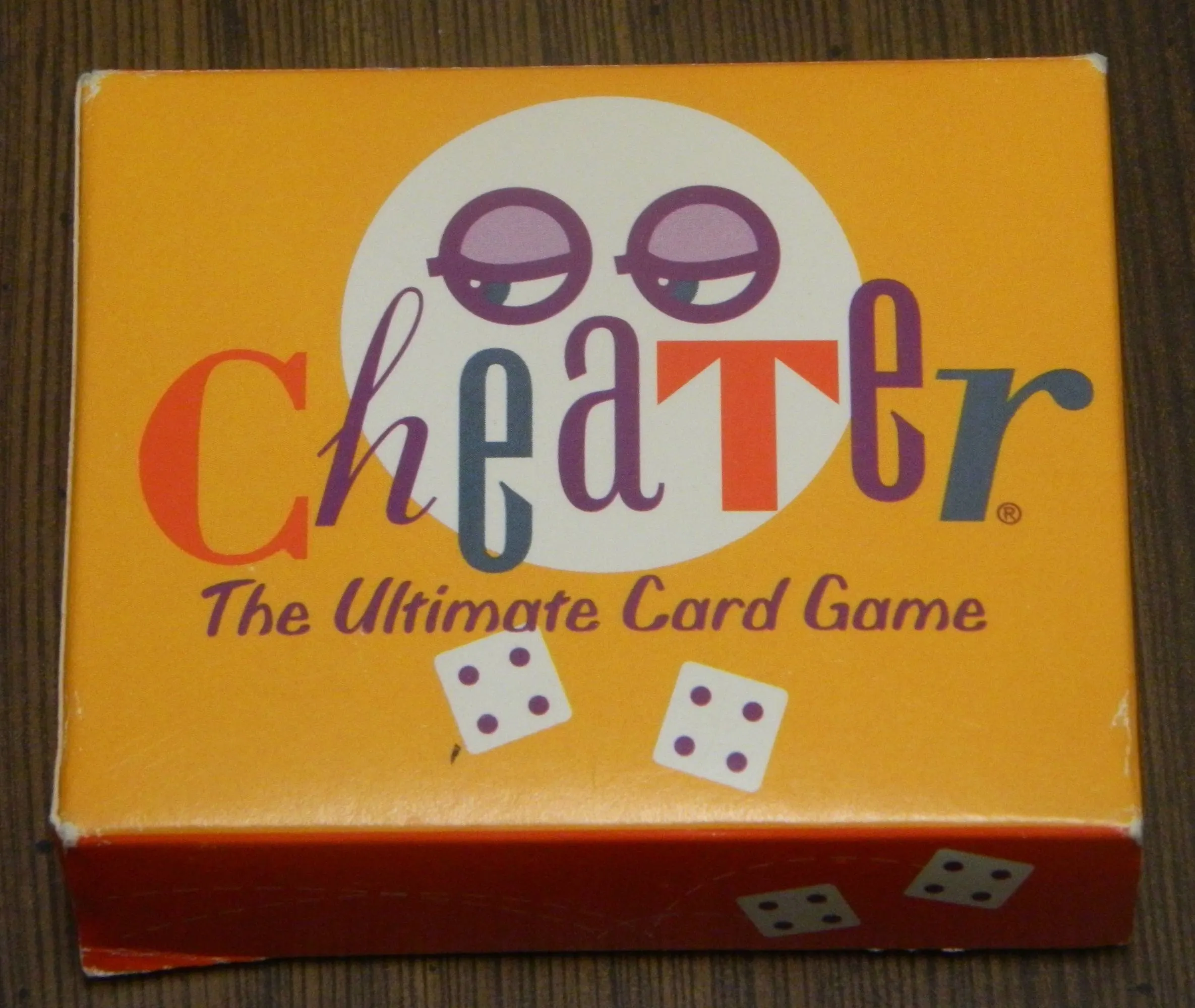With the U.S. presidential election just a couple weeks away I have been looking at some of the political games in my board game collection. A while ago I looked at Sammy The White House Mouse Game which was a dull and way too simple children’s game that hearkened back to games like Candyland. Today I am looking at a game that is a little more political, G. Gordon Liddy’s Hardball Politics ’96. While Sammy The White House Mouse Game was not a good game, it looks like a great game in comparison to this game.
How to Play
Each player chooses a player piece and takes all of the electoral college cards from their side of the gameboard. Each player places their token on the campaign headquarters space on their side of the board. Shuffle the dirty tricks and power cards. All of the players roll the dice and the player who rolls highest gets to play first.
On a player’s turn they roll the dice and move the corresponding number of spaces. If a player rolls doubles they will get to roll again after they move their piece. If a player lands on a state that they control, nothing happens. If a player lands on a state that is controlled by another player, the player has two choices:
- Campaign: The player checks off one of the boxes next to the state that they landed on. If the second box is checked off on a state, the player takes the corresponding state for themselves.
- Dirty Trick: Draw the top dirty trick card and do what it says. If the card says to forfeit the state, the current player takes the state from the person currently controlling it. This can be countered if the player who owns the state card has a power card that prevents a player from stealing a state.
If you draw a dirty tricks card that says to report to the Senate, House of Representatives, Supreme Court or G-Man the current player moves their pieces to the corresponding space on the gameboard.
When a player is sent to the Senate, House of Representatives, Supreme Court or G-Man they must roll doubles in order to return to the campaign trail. If after three turns the player is unable to roll doubles, they return to the board and can move on their next turn.
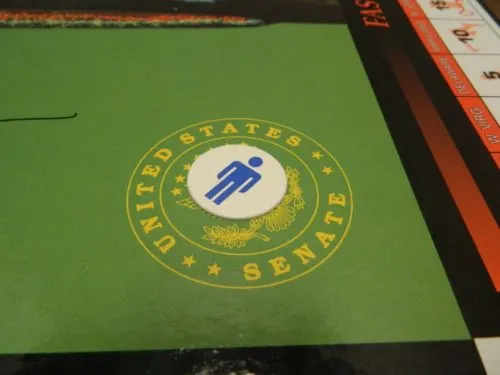
This player is stuck in the Senate and has to roll doubles in order to leave or will have to wait three turns to return to the board.
If a player lands on the “FBI”, “CIA”, “Press Corps”, “Secret Service” or their own “Campaign Headquarters” space they draw a power card. The player can use the power card at any time. If a player is ever removed from the campaign trail (the outer track) they must discard all of their power cards.
When a player falls below 70 electoral votes, the player has two choices. The player can quit the game and all states controlled by that player are free for any other player to take control of. The player otherwise can choose to join one of the other players (who doesn’t already have a vice president) as their vice president. When a player joins as a vice president the two players work together to get to 270 electoral votes. Both players take their turns and share their power cards. Both players will win or lose together.
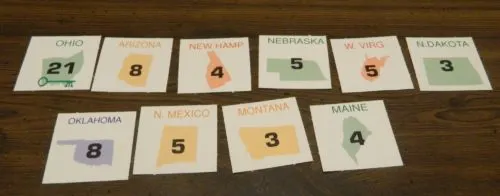
This player has fallen below 70 electoral votes. They either must quit the game or join another player as their vice president.
Once a player/team reaches 270 electoral votes, they remove their playing piece(s) from the gameboard and move them to the election central space.

This player/team has reached 270 electoral votes so they can enter the election central space and try to win the game.
All power cards that they have are discarded. While a player(s) is in campaign central none of the states controlled by that player(s) can be stolen outside the use of a recount card. The player(s) roll the dice like normal on their turn. If they roll doubles, the player(s) wins the game.
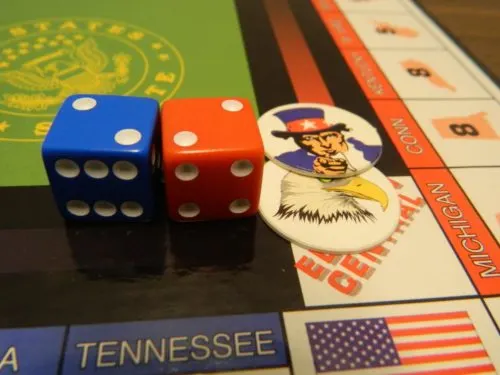
The Uncle Sam and eagle players have acquired 270 electoral votes so they have moved to election central. They rolled doubles so they have won the game.
Review
So I am going to just get right to the point and tell you that unsurprisingly G. Gordon Liddy’s Hardball Politics ’96 is essentially a Monopoly clone/parody. You pretty much just move around the board collecting properties/states while trying to take money/votes away from the other players until they have none remaining. The gameboard is essentially the same as Monopoly and the House of Representatives/Senate/Supreme Court/G-Men work almost exactly like jail in Monopoly.
There are a lot of people that love and hate Monopoly. I find myself somewhere in the middle. Monopoly is one of the first board games that most people play and it has some decent ideas. Monopoly also has a lot of serious problems mostly dealing with the game feeling like it is never going to end. No matter what your thoughts are of Monopoly though, I can assure you that G. Gordon Liddy’s Hardball Politics ’96 is far worse.
You can argue about how much strategy there is in Monopoly but there is next to none in this game. Basically the game is an exercise of passing state cards around until one player/team has enough votes to win the game. Doesn’t that sound interesting. The game is a boring exercise in patience as it takes forever to end.
So lets’ get into the little amount of strategy that there actually is in the game. Basically you need to get as many state cards as you can or lose as many states as you can to become vice president (I will get to this shortly). There is a lot of luck involved in getting states since it all comes down to the roll of the dice and which cards you draw. There are two different ways to take states. The first is the slow way which involves landing on the same space twice. You would think that this would be the slow but steady way of acquiring states but that really isn’t the case.
The far better way of taking states is to just keep drawing dirty tricks cards. This is the better option for two reasons. First a large majority of the cards in the deck steal the state from the player that currently controls it. It is much easier and quicker to steal states in this manner than landing on the same space twice. Unless you want to lose the game you have to use the dirty trick cards to stay with the other players. The other reason to draw the dirty trick cards is that the only possible punishment is getting sent to jail (also referred to as House of Representatives, Senate, Supreme Court, and G-Men in this game). Usually you are going to get a state and at worst you will waste one to three turns. That sounds like a good trade off to me.
For those of you who are not familiar with G. Gordon Liddy, he was a popular political pundit in the 1990s to the early 2010s. He is most known though for being one of the perpetrators of the Watergate Scandal in 1972. Before playing the game I knew little about G. Gordon Liddy. After finding out more about him I have to say that parts of the game make a little more sense. Either G. Gordon Liddy is extremely naive or he was trying to be funny since the game is really skewed towards using dirty tricks and the rules keep bringing up that you shouldn’t use dirty political tricks in elections. This is kind of funny since he was convicted of being part of one of the most famous political scandals in US election history.
When reading through the rules I could tell that G. Gordon Liddy’s Hardball Politics ’96 was not going to be a good game. The one mechanic that actually looked kind of interesting though was the idea of the Vice President. I thought it was an interesting way of keeping players in the game that fell too far behind. I thought playing a Monopoly style game with a teammate might be interesting. The problem is that while it looked like an interesting idea, it actually ruins the game. The logic behind the whole mechanic is just so flawed. Unless two players go out of the game at essentially the same time and become vice presidents for the other two players, the first player to become a vice president will decide the winner of the game since one player will never compete with two players playing together.
This mechanic is so flawed that you probably improve your odds of winning the game by purposefully throwing the game at the beginning hoping to lose enough states to drop below 70 electoral votes. This is because the first player to become vice president is almost guaranteed to share in victory. It is just so weird having a mechanic that rewards you for doing poorly early in the game. When I got to the point that I was never going to catch up to the other players, I purposely started preparing to be vice president. I didn’t draw any dirty trick cards and just started campaigning in every state and acquired power cards to use once I became vice president. Not surprisingly my teammate and I ended up winning the game. I just think it is kind of a shame that the mechanic is so broken because it could have been an interesting mechanic.
I now have to talk about the terrible, boring, drawn out end game of G. Gordon Liddy’s Hardball Politics ’96. When a player, or more likely team, reaches 270 points they go to election central and try to roll doubles to try and win the game. I understand that the game did this to give the other players a chance to catch up but it is next to impossible to do so. The only way to steal states when a player/team is in campaign central is to draw a recount power card. So all you have to do to stop them from winning is to land on one of the few spaces that let you draw a power card, hope to draw the right power card (there aren’t a lot of recount cards), and then successfully steal a state from the player/team in campaign central that drops them below 270 electoral votes. I would guess this is highly unlikely. Therefore the end game just drags out until a player/team rolls doubles extending a game that already takes way too long. It is kind of fitting that such a bad game has a terrible ending.
Speaking of the game’s length, it might be the worst part of the entire game. G. Gordon Liddy’s Hardball Politics ’96 is a terrible game but what makes it worse is that it takes so long. The game’s mechanics are terrible but if the game was only around 30 minutes long you could get through them quickly and move onto something else. The game will usually take one to two hours though as you continue to pass cards between players. This is so boring and is such a waste of time. While I have played quite a few bad games, most of the bad games are at least short. That is not the case with G. Gordon Liddy’s Hardball Politics ’96.
The game even fails when it comes to the components. Lets start with the rules that are somehow poorly written despite being such a simple game. Whoever wrote the rules don’t even address several issues that will come up in the game so you have to make up your own rules on the fly. The gameboard is extremely bland. The cards and playing pieces are made of really thin cardboard. While the artwork on the playing pieces is not terrible I have to say that it was surprisingly difficult recognizing who some of the people in the game are even supposed to be.
There are so many things wrong with the game that you have to wonder if the game was ever play tested. The game is so boring, rules are broken, and the game actually encourages you to lose early on in the game. Two of the players get one less vote to start the game which was probably unavoidable and is inconsequential but still an issue. Then there are the players that get stuck with one or two large states and a bunch of really small states. This means the player can get eliminated/become vice president quickly when those states get stolen. There is also a problem where you are constantly forced to count up your votes if you are near 70 or 270 electoral votes. There are just so many issues with the game that I can’t believe a lot of effort was put into making this game.
While G. Gordon Liddy’s Hardball Politics ’96 is far from a good game (it is actually one of the worst games I have ever played), I have to give the game credit for eerily predicting elements from the 2016 election. I don’t know if it was just a wild coincidence but it was just strange that the player playing as Hillary Clinton (or it at least looked like Hillary Clinton) had a dirty trick card played against them that involved Hillary Clinton having a health scare/controversy. While Donald Trump is not in the game, there are many dirty trick cards in the game that would accurately describe things he has done in the campaign. I don’t know if it is funny or just sad that a political game from 1995 could do such a good job predicting an election two decades in the future.
Final Verdict
G. Gordon Liddy’s Hardball Politics ’96 is without a doubt one of the worst games I have ever played. It is essentially a Monopoly clone that takes all of the fun out of Monopoly and adds boring broken rules. The game has next to no strategy as you might as well keep drawing dirty trick cards since there is little punishment for doing so. Add in the broken vice president rules and there is just not much going for the game. Honestly the only thing I somewhat enjoyed about the game is how some of the dirty trick cards were eerily predictive of things that are happening in our current election 20 years after this game came out.
With how bad of game it is I have a hard time recommending the game to anyone. If you really like politics and want to laugh at the eerily accurate dirty trick cards it might be worth it if you can get a really good deal on the game but otherwise I would avoid it.
If you would like to purchase G. Gordon Liddy’s Hardball Politics ’96 you can find it on Amazon.

